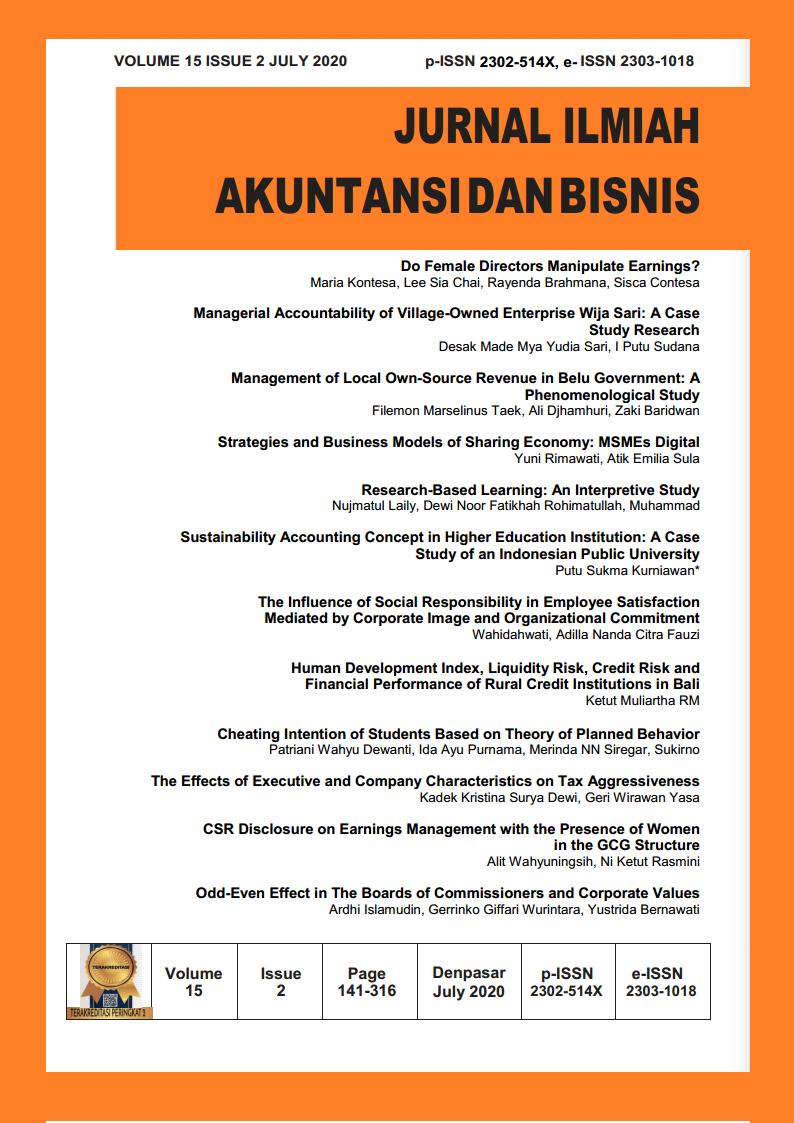Management of Local Own-Source Revenue in Belu Government: A Phenomenological Study
Abstract
This study aims to explore the management of Original Local Government Revenue in the Belu District government with a phenomenological approach, namely an awareness study of the experience of the State Civil Apparatus in managing Original Local Government Revenue and to explain the meaning of the actions taken. The researcher uses the interpretive paradigm understanding method to uncover the aims and objectives of the informants and uses the Husserl phenomenology approach to explain or uncover the phenomenon of experience based on awareness that occurs by individuals, which in this case is the State Civil Apparatus which directly manages Original Local Government Revenue. The results of the study revealed that the informants interpreted the management of Original Local Government Revenue as duties and responsibilities related to the management of Regional Original Revenues including the management of regional taxes whose revenue always fluctuates due to non-compliance of taxpayers. Management of the results of the separated regional wealth always exceeds the target by means of equity participation in BUMD, management of other original authentic regional income by depositing regional cash to the bank and finding other sources of revenue through the auction of assets in the form of vehicles. The management of retribution is constrained due to various obstacles including the lack of adequate facilities.
Keywords: Public sector accounting, original local government revenue, phenomenology, interpretive paradigm, local tax.
Downloads
References
Andriani, R. N. R., & Wahid, N. N. (2018). Pengaruh Pendapatan Asli Daerah dan Dana Perimbangan Terhadap Kemandirian Keuangan Daerah (Studi Kasus pada Pemerintah Kota Tasikmalaya Tahun 2006-2015). Jurnal Akuntansi, 13(3), 30–39.
Ardiansyah, R. (2019). Amnesti Pajak: Perspective Wajib Pajak Suatu Studi Fenomenologi. Universitas Brawijaya.
Burrell, G., & Morgan, G. (1979). Assumptions about the Nature of Social Science. In Sociological Paradigms and Organisational Analysis (pp. 1–9). https://doi.org/10.4324/9781315609751-1
Chua, W. F. (1986). Radical Development in Accounting Thaought. The Accounting Review, 61(4), 601–632.
Colaizzi, P. R. (1973). Reflection and research in psychology. IA: Kendall/Hunt.
Covaleski, M., & Aiken, M. (1986). Accounting and theories of organizations: Some preliminary considerations. Accounting, Organizations and Society, 11(4–5), 297–319. https://doi.org/10.1016/0361-3682(86)90002-4
Creswell, J. W. (2015). Penelitian Kualitatif Dan Desain Riset : Memilih Di Antara Lima Pendekatan (Edisi Ke - 3). Pustaka Belajar.
Djamhuri, A. (2011). Ilmu Pengetahuan Sosial dan Berbagai Paradigma Dalam Kajian Akuntansi. Akuntansi Multiparadigma, 2(1), 1–185.
Faisal A. Rani, M. Syahbandir, Eddy, P. (2010). Kontribusi PAD dalam APBD sebagai Indikator Keberhasilan Otonomi Daerah. KANUN, 8(51), 235–255.
Halim, A., & Kusufi, M. S. (2014). Akuntansi Sektor Publik : Akuntansi Keuangan Daerah (Edisi 4). Salemba Empat.
Johnson, P. . (1992). Teori Sosiologi Klasik dan Modern (R. M. Z. Lawang (ed.)). PT Gramedia.
Kamayanti, A. (2017). Metodologi Penelitian Kualitatif Akuntansi. Yayasan Rumah Peneleh.
Keen, E. (1975). Doing research phenomenologically. Unpublished manuscript, Bucknell University.
Kuratko, D. F., Hornsby, J. S. dan Naffziger, D. W. (1997). An Examination of Owners-Goals in Sustaining Entrepreneurship. Journal of Small Business Management, 35(1), 24–33.
Kurniawan, A. (2019). Analisis Pengelolaan Retribusi Daerah Sebagai Strategi Peningkatan Pendapatan Asli Daerah (PAD) (Studi Kasus pada Seluruh Organisasi Perangkat Daerah (OPD) Terkait Retribusi di Kabupaten Tulungagung). Jurnal Ilmu Administrasi Publik, 5(1), 87–96.
Lowe, E.A & Tinker, A. . (1977). Sitting the accounting problematic: towards an intellectual emancipation of accounting. Journal of Bussines Finance & Accounting, 3, 263–276.
Mangoting, Y. (2018). Quo Vadis Kepatuhan Pajak? Akuntansi Multiparadigma, 9(3), 451–470. https://doi.org/10.1515/9783110459418-037
Moustakas, C. (1994). Phenomenological research methods. Phenomenological Research Methods. https://doi.org/10.4135/9781412995658
Nurhemi, G. S. (2015). Dampak Otonomi Keuangan Daerah Terhadap Pertumbuhan Ekonomi Di Indonesia. Buletin Ekonomi Moneter Dan Perbankan, 18(2), 183–206. https://doi.org/10.21098/bemp.v18i2.522
Oluseyi O, A. (2010). A comparative study of the adoption of accrual accounting in government. Cardiff University.
Peraturan Menteri Dalam Negeri Republik Indonesia Nomor 38 Tahun 2018 Tentang Pedoman Penyusunan Anggaran Pendapatan Dan Belanja Daerah Tahun Anggaran 2019.
Peraturan Menteri Keuangan Republik Indonesia Nomor 223/PMK.05/ 2016 Tentang Pernyataan Standar Akuntansi Pemerintahan Berbasis Akrual Nomor 06 Tentang Akuntansi Investasi (Revisi 2016).
Peraturan Pemerintah Nomor 38 Tahun 2008 Tentang Pengelolaan Barang Milik Negara/ Daerah.
Putri, N. E., & Nurhasanah. (2019). Sosialisasi Pajak, Tingkat Pendidikan dan Sanksi Pajak Terkait dengan Kepatuhan Wajib Pajak UKM (Studi Kasus: Pengusaha UKM Kecamatan Manggar Belitung Timur). Jurnal STEI Ekonomi, 28(02), 213–232.
Stevick, E. L. (1971). An empirical investigation of the experience of anger. Duquesne Studies in Phenomenological Psychology, 1, 132–148. https://doi.org/10.5840/dspp1971114
Sudaryati, D., & Heriningsih, S. (2014). Pengaruh Kompetensi Sumber Daya Manusia Terhadap Penerapan Akuntansi Akrual Dengan Perangkat Pendukung Sebagai Variabel Moderating (Studi Empiris Pada Pemerintah Kota Yogyakarta). Optimum: Jurnal Ekonomi Dan Pembangunan, 4(2), 181. https://doi.org/10.12928/optimum.v4i2.7795
Syukri, M., & Hinaya, H. (2019). Pengaruh Pertumbuhan Ekonomi, Pendapatan Asli Daerah, Dana Alokasi Umum Dan Dana Alokasi Khusus Terhadap Anggaran Belanja Modal Kabupaten & Kota Provinsi Sulawesi Selatan. JEMMA | Journal of Economic, Management and Accounting, 2(2), 30. https://doi.org/10.35914/jemma.v2i2.245
Tinker, A. . (1975). An accounting organization for organizational problem solving. Manchester Bussines Scholl.
Undang-Undang Nomor 23 Tahun 2014 Tentang Pemerintahan Daerah.
Undang-Undang Nomor 28 Tahun 2009 Tentang Pajak Daerah Dan Retribusi Daerah.
Undang-Undang Nomor 33 Tahun 2004 Tentang Perimbangan Keuangan Antara Pemerintah Pusat dan Pemerintah Daerah.
Zulyanto, A. (2010). Pengaruh Desentralisasi Fiskal terhadap Pertumbuhan Ekonomi di Provinsi Bengkulu. Jurnal Ekonom, 17(3), 1–122.




















